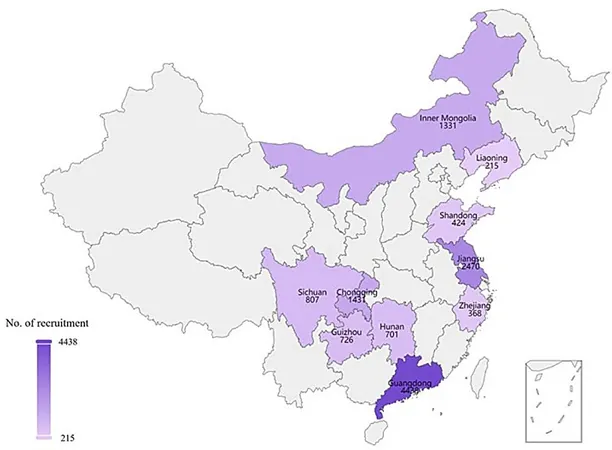
Groundbreaking Pregnancy Health Study Unveils Shocking Complications and Regional Disparities in China!
2024-11-18
Author: Arjun
A major new study has launched an extensive pregnancy health initiative across China, analyzing the health of over 20,000 families and revealing alarming trends in maternal and child health. This transformative research effort, spearheaded by BGI Genomics in collaboration with medical facilities from 12 cities, was officially published in the European Journal of Epidemiology in November 2024.
This ongoing cohort study commenced in 2022, with researchers ambitiously collecting more than 161,000 biological samples—including blood, urine, and vaginal fluid—during critical pregnancy stages: early, mid, late, and postpartum. The research aims to provide groundbreaking insights into the maternal and child health landscape, contributing to a deeper understanding of the Developmental Origins of Health and Disease (DOHaD). This approach underscores how early-life experiences can shape long-term health outcomes.
Disturbing Trends and Geographic Trends
The findings indicate a notable increase in maternal age, with participants averaging just over 29 years old—illustrating a societal shift towards later motherhood. Weight management during pregnancy is increasingly a cause for concern, as the proportion of women with pre-pregnancy Body Mass Index (BMI) over 30 surged dramatically from 5.57% to 22.16% by delivery. Alarmingly, the prevalence of women with BMIs between 25 and 30 tripled, highlighting an urgent need for improved weight management strategies during pregnancy.
Geographical analysis provides further insights: 41% of participants were below 160 cm in height, while 24% exceeded 165 cm. These statistics illustrate regional variances, with taller women predominantly found in northern provinces like Liaoning and Inner Mongolia. The cesarean section rates have reached a staggering 39.76%, indicating a slight increase compared to previous years, raising questions about birth methods in modern obstetrics.
Educational factors revealed that 68.59% of participants possess a bachelor's degree, emphasizing the correlation between education and health outcomes. Notably, Guangdong province reported a significant 12.22% of women having two or more children—an occurrence potentially linked to the region's robust economy and comparatively higher fertility rates.
Alarming Complications and Vulnerable Populations
The study identified several prevalent pregnancy complications that could have serious implications for maternal and fetal health. Premature rupture of membranes (PROM) affected 18.29% of participants, which can lead to heightened risks of infection and preterm labor. Additionally, a concerning 16.74% were diagnosed with gestational diabetes mellitus (GDM), increasing the likelihood of complications such as macrosomia and preeclampsia.
Furthermore, 8.44% experienced hypothyroidism, while preterm births were recorded in 4.92% of cases—underscoring the urgent need for specialized care for these vulnerable infants. Identifying high-risk groups, the research uncovered that women utilizing assisted reproductive technologies (ART) showed increased incidences of preterm birth and preeclampsia, calling for vigilant monitoring during pregnancy. Mothers aged 35 and older demonstrated heightened risks for both preterm deliveries and GDM, particularly in Shandong province, which has the highest number of older mothers.
Regional disparities emerged prominently; Guangdong reported a staggering 266 cases of thalassemia among 1,503 participants, while only 79 cases were detected in 3,339 women from other regions. Moreover, the discovery of nine cases of fetal chromosomal abnormalities and four instances of fetal genetic disorders highlights the compelling need for robust prenatal genetic screening.
Looking Ahead: A Call for Further Research
As researchers push forward with the next phase of this enlightening project, they plan to delve deeper into five key types of pregnancy-related diseases through a systematic analysis. They aim to develop comprehensive blood marker curves, which will help identify the gestational weeks at which these health issues manifest. This innovative approach leverages the extensive biological sampling conducted throughout pregnancy to uncover previously hidden relationships between phenotypes and the evolving omics data.
Dr. Zhou Si, chief scientist at the Institute of Intelligent Medical Research (IIMR) at BGI Genomics, expressed, "With our diverse data collection and biological samples, this cohort serves as a prime candidate for DOHaD and multi-omics research. Our goal is to generate insightful revelations about the developmental origins of health and diseases, particularly in the context of Chinese demographics."
Stay tuned for what could be groundbreaking revelations in the field of maternal and child health—this study is just the beginning!



 Brasil (PT)
Brasil (PT)
 Canada (EN)
Canada (EN)
 Chile (ES)
Chile (ES)
 España (ES)
España (ES)
 France (FR)
France (FR)
 Hong Kong (EN)
Hong Kong (EN)
 Italia (IT)
Italia (IT)
 日本 (JA)
日本 (JA)
 Magyarország (HU)
Magyarország (HU)
 Norge (NO)
Norge (NO)
 Polska (PL)
Polska (PL)
 Schweiz (DE)
Schweiz (DE)
 Singapore (EN)
Singapore (EN)
 Sverige (SV)
Sverige (SV)
 Suomi (FI)
Suomi (FI)
 Türkiye (TR)
Türkiye (TR)